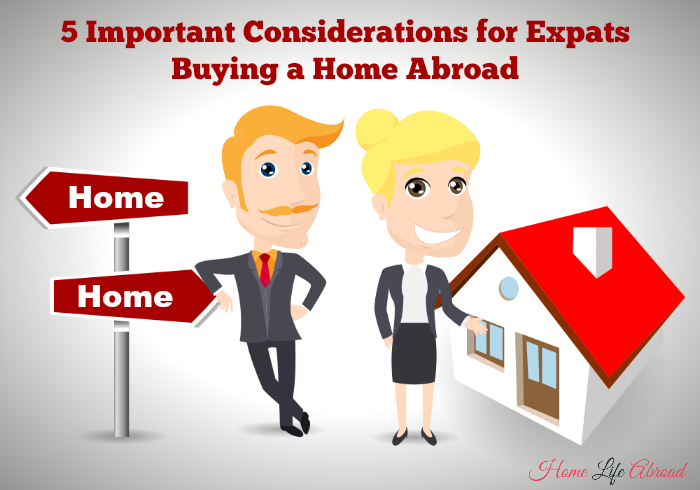I’ve been living on-and-off abroad for the past 12 years. It’s a scary reality for me, especially because I’ve reached a point of accepting that this country may become my permanent home. As such, I need to consider what that means for me financially and what it means for my future. Am I going to finally take a big step in digging deep roots here and accept that I’m never returning to live in South America? Yikes… what a thought.
The longer I’ve been living here, the more upset I become by my rental situation. I have a great living arrangement, but rent eats up my earnings without anything left to show after years of payments. Monthly mortgage payments, on the other hand, are equivalent to the amount I pay for rent and yet at the end of years of payments, I actually OWN a home. And this home only goes up in value through the years (as a matter of fact, a recent publication showed that apartments in my area have gone up in value over $200,000 in the last 5 years!!).
The bottom line is: I need to start putting deep thought into how I can buy a home here. And since this site is about living abroad and all the challenges and adventures that move encompasses, then what better place to discuss the issues and questions that arise when buying a home abroad?
Here are the 5 questions we expats need to consider when buying a home in our new country of residence*.

1.) How long are you planning to stay in the country?
This is a difficult question for many of us expats since a lot of us have no idea if our move is permanent, semi-permanent or temporary.
If you’re living in the region for a short amount of time, investing all your savings into a home that you will only use shortly may not be the best use of your finances. It would tie up your money in a mortgage situation that would not be easy to withdraw. Don’t forget that aside from the cost of the house, there are many aspects that need to be covered upon purchase and on a monthly basis, such as real estate fees, land and purchase taxes, home owner’s insurance and so on. So this is not a purchase decision that should be taken lightly.
On the other hand, if your move is at least semi-permanent and you are looking to fully settle into the new country, why not consider buying a home? Your money goes into a solid investment option (let’s just hope the real estate bubble doesn’t pop), and your money goes into owning a home rather than paying constant rent. Fellow expat bloggers even discuss how they profited from buying a home on their stay abroad.
Sure, it ties up your money into real estate, but if you can afford it and it’s a viable and sensible option for your move, why not become a home owner in your new country of residence?
2.) How will you finance the purchase?
To me, this is the most complicated question of all. Where I live, down payments are so high that they are almost impossible for young people like myself to cover, even if we have a solid amount of savings. Other locations offer a far more reasonable down payment option for a mortgage, so research is necessary to discover just how much you will need to cover for that initial payment.
The reality is that most of us will have to take out a home loan in order to purchase our own home. But this too needs to be done very carefully. This step requires discussing with a professional who can help understand what it entails and whether you will be able to cover the loan payments in a timely manner.
Start your research by consulting with relevant brokers or agencies in your new country of residence and gather all the information you need. Agencies can connect you to local brokers and help guide you through the process, so make sure to use broker services, even if it entails a consultation fee. Buying a home will likely be the biggest financial decision you will ever make, so it shouldn’t be done without the assistance of professionals.
3.) Are there limitations based on immigration status?
This is an often-ignored issue but one that is of utmost importance. Each country has its own laws regarding home purchase and who is allowed to purchase and at what cost. Israel, for example, provides tax discounts to new immigrants in order to help with the home purchase. Most countries will not do this for their new residents, so it’s imperative that you try to find out if there will be roadblocks on the way to home ownership.
Your status could make a huge difference in taking out loans or making home purchases. In some countries, if you are on a work visa, you may find yourself denied for home ownership. Other countries may limit the purchases solely to citizens of the country and may veto this privilege even to permanent residents without citizenship.
What is more, certain countries may even limit home ownership to specific religions. The Maldives, for example, is very stern about home ownership and in the past revoked the option of ownership to any non-citizens (only Muslims can be citizens of Maldives). However, as of July this year, they have allowed foreigners to purchase land in many islands. Just take into account that in more unpredictable countries like these, this may be short-lived… it only takes one opposition party to take over the government for prior laws to be rescinded.
Researching and discussing options with professionals in the field is absolutely vital before any further action is taken.
4.) Are there taxes or any issues that could develop in your country of birth/citizenship?
This is more important for American citizens over other countries, but should still be considered regardless of your background and any other citizenships. Certain countries, like the US, impose their tax system on citizens regardless of where they live in the world. That means that assets, such as home ownership, are considered in audits and yearly tax payments.
There are often professional accountants and lawyers that specialize in these global taxation issues and could likely answer your questions regarding taxes or any potential issues that could arise when purchasing a home abroad. If you can’t find one in your new country of residence, look for one in your home country.
5.) What will be required of you in order to acquire loans or purchase a home?
Each country will have their own bureaucratic process in order to purchase homes, land or acquire loans. Anyone interested in purchasing a home will need to ensure that all documents are accessible and ready for submission, so make sure to find out what is needed of you for the transaction to take place.
This could mean a number of things: bank statements showing your account balance, proof of work visa or residency status, citizen guarantors to sign for you in case you do not cover monthly mortgage payments or leave the country abruptly, and in some cases (as mentioned above) even proof of religious or ethnic background.
This information may not be so accessible online, depending on the country you are living in (WorldofExpats has details on numerous popular countries for expats, so it’s a good starting point). The appropriate person to ask is a professional who (preferably) specializes in home ownership by non-citizens or new immigrants. They will have experience in these home purchases and will already understand the requirements.
[note note_color=”#FFEACC”]If you are an expat and had experience with purchasing homes abroad, let us know your tips or any guidance below! The rest of us appreciate it. :D[/note]
*Please note: I am not a professional or a broker. I’m only sharing the information that I have found through my own personal research and understanding of my current expat situation. Before you take any action regarding home purchases or loans, speak to a professional.
Thanks to freekpik for the unedited version of the image





Thank you for the tips! My husband and I have been considering purchasing an apartment in Australia instead of renting and you gave us some necessary insight.